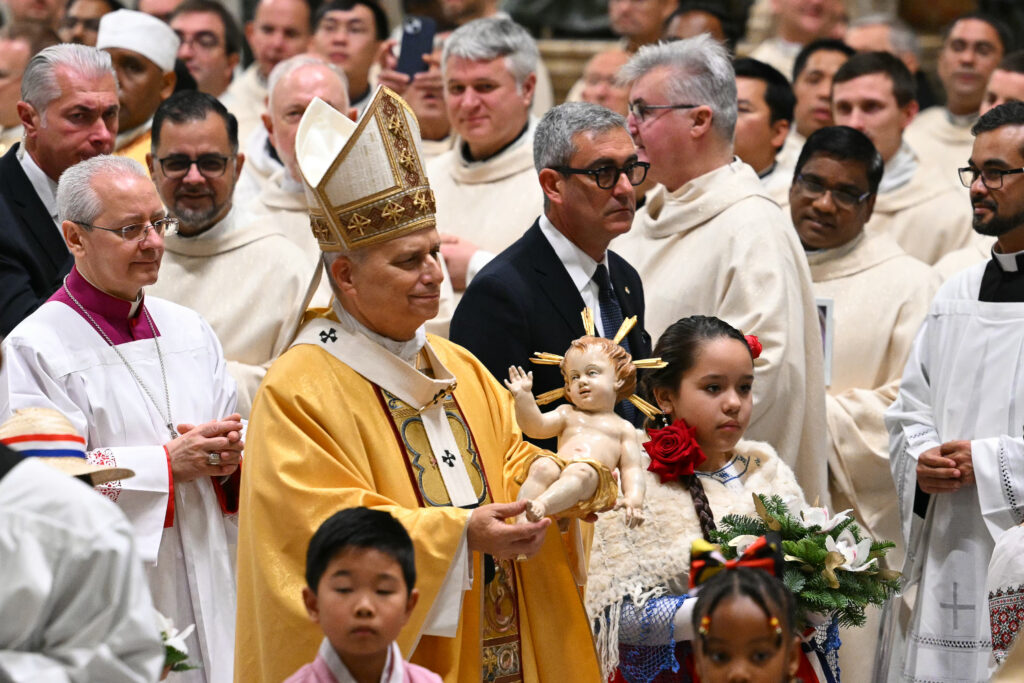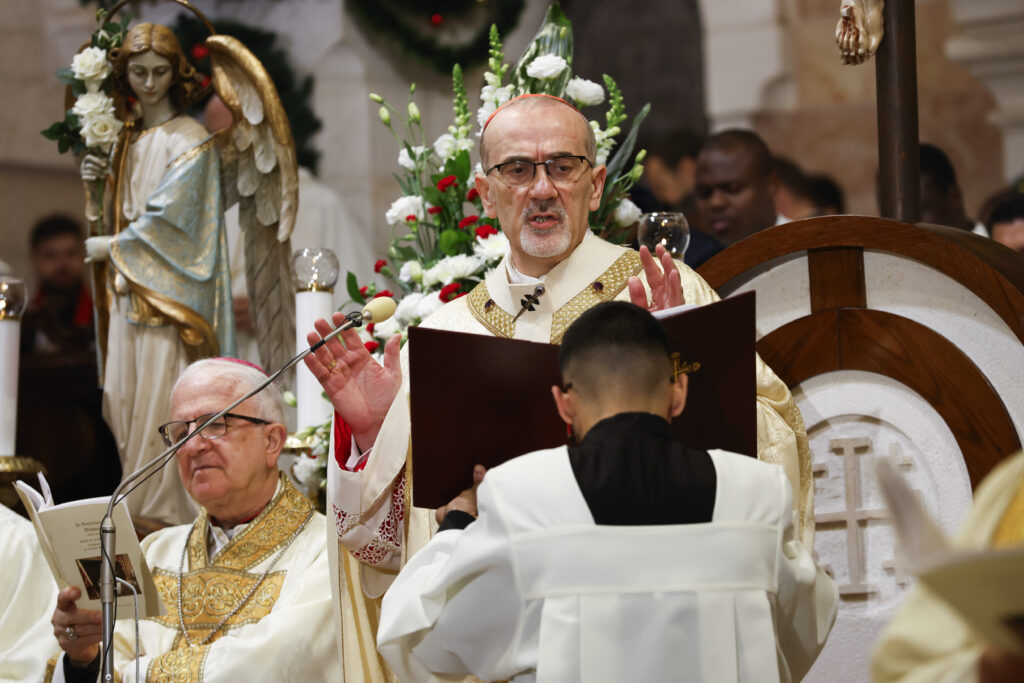AFP Asia Business
Pope Leo expected to call for peace during first Christmas blessing
Pope Leo XIV is expected to renew his calls for peace Thursday when he delivers his first Christmas blessing from St Peter’s Basilica at the end of a year overshadowed by conflict, but also marked by hopes for peace in Gaza. In Bethlehem, the Christian community celebrated its first festive Christmas in more than two years as the occupied West Bank city emerged from the shadow of the war in Gaza. However, the Pope’s call this week for a one-day global truce went unheeded in Ukraine, where fighting continued, as the pontiff prepared to deliver his “Urbi et Orbi” blessing at 12:00 (1100 GMT) — during which popes usually speak about conflicts around the world and urge peace.Before the address, the Pope celebrated his first Christmas Mass Wednesday evening where he described the celebration as a feast of “faith, charity and hope”.He also spoke in front of St Peter’s Basilica to offer Christmas wishes and thank those who had come to follow the mass on outdoor screens despite rainy weather.”St Peter’s is very large but unfortunately it is not large enough to receive all of you,” he told the crowd of around 5,000 people.Leo will also hold another mass on Christmas Day, renewing a tradition from the times of late pope John Paul II (1978-2005).- Celebration in Bethlehem -Hundreds of worshippers also gathered for mass at the Church of the Nativity in Bethlehem Wednesday night as the Palestinian city ushered in its first festive Christmas during the Gaza war.Throughout the conflict that began with Hamas’s attack on Israel in October 2023, a sombre tone had marked Christmases in the biblical birthplace of Jesus Christ.But celebrations returned Wednesday with parades and music in the West Bank city, as a fragile truce held in Gaza, where hundreds of thousands of people face winter in makeshift tents.With pews of the Church of the Nativity filled long before midnight, many stood or sat on the floor for the traditional mass to usher in Christmas Day.At 11:15 pm (2115 GMT) organ music rang out as a procession of dozens of clergymen entered, followed by Jerusalem’s Latin Patriarch, Cardinal Pierbattista Pizzaballa, who blessed the crowd with signs of the cross. In his homily, Pizzaballa urged peace, hope and rebirth, saying the Nativity story still held relevance in the turbulence of modern times.He also spoke of his visit to Gaza over the weekend, where he said “suffering is still present” despite the ceasefire.”The wounds are deep, yet I have to say, here too, there too, their proclamation of Christmas resounds,” he said. “When I met them, I was struck by their strength and desire to start over.”- ‘Desire of life’ -Hundreds took part in the parade down Bethlehem’s narrow Star Street on Wednesday, while a dense crowd massed in the square.”Today is full of joy because we haven’t been able to celebrate because of the war,” said Milagros Anstas, 17.Men dressed as Santa Claus sold toffee apples and toys as families took photographs in front of a nativity scene framed by a giant star. As darkness fell, multi-coloured lights shone over Manger Square and a towering Christmas tree glittered next to the Church of the Nativity.The basilica dates back to the fourth century and was built on top of a grotto where Christians believe Jesus was born more than 2,000 years ago.Bethlehem residents hoped the return of Christmas festivities would breathe life back into the city.”We need to get the message to the whole world and this is the only way,” said George Hanna, from the neighbouring town of Beit Jala.In Syria, Christmas lights illuminated Damascus’s Old City despite the Christian community’s fears of violence after a deadly attack in June.Around the district, home to several important churches, red baubles hung from trees, shopkeepers put up Christmas decorations and street vendors peddled warm chestnuts.”Syria deserves joy and for us to be happy, and to hope for a new future,” said student Loris Aasaf, 20.- Sombre festivities -In stark contrast to the messages of religious leaders, US President Donald Trump wished a Merry Christmas “to everyone, including the radical left-wing scum”, referring to Democrats.Severe weather disrupted the holiday season in California where authorities, fearing dangerous flooding, have declared a state of emergency in Los Angeles and ordered evacuations.In Australia, Prime Minister Anthony Albanese had a sombre message after the deadly attack during a Hanukkah celebration at Bondi Beach on December 14.”After the terror inflicted on Jewish Australia celebrating Hanukkah and Bondi Beach, we feel the weight of sorrow in our hearts.”
‘We hold onto one another and keep fighting,’ says wife of jailed Istanbul mayor
Turkish democracy has taken a heavy beating since the jailing of Istanbul’s popular opposition mayor Ekrem Imamoglu, his wife told AFP, saying it has been painful for his family but that the ordeal has made them stronger. “It’s an extremely difficult time for our children and for me… but we hold onto one another,” Dilek Kaya Imamoglu, 51, told AFP in her first interview with foreign media. Her husband — the only politician seen as capable of beating President Recep Tayyip Erdogan — faces 2,430 years in prison from a blizzard of charges many see as a bid to stop him standing against Erdogan in 2028.But Dilek Kaya Imamoglu said they have taken strength from her husband’s message “to never lose hope”. Imamoglu’s arrest in March, just before he was named as the main opposition CHP’s candidate for the presidential race, sparked Turkey’s worst bout of street unrest since 2013. He is accused of heading a sprawling criminal network and exerting influence “like an octopus” in a 4,000-page indictment that covers everything from graft and bribery to money laundering. The first court hearing is set for March 9.But his wife warned that “the public conscience cannot be silenced. These hardships do not lead me to despair but to solidarity. I trust the will and conscience of the people,” she said. ‘Freedom is in my mind’-She described how hundreds of police descended on the Istanbul mayor’s home on the morning of his arrest. “I was shocked by what I saw… My heart felt like it was beating outside my chest. I will never forget the worry in our children’s eyes.”But Imamoglu turned to them and said: “We will hold our heads high and never lose hope.” “And instead of bowing to it, we chose to fight,” his wife said. Dilek Kaya Imamoglu said the family is allowed weekly visits to see him in Silivri prison, west of Istanbul, where several other leading opponents of Erdogan are also being held.Despite the serious charges he is facing, Imamoglu’s spirit is high, she said. She described those moments as “very precious, but also very heavy”.Her husband “resists by working, taking notes, generating new ideas for our country’s future and reading books”. “‘My freedom is in my mind,’ he says. Messages of solidarity, letters, and visitors give him incredible strength. It helps him feel that he is not alone inside, but together with millions.”- Western silence ‘disappointed us’-Rights groups have accused Europe of turning a deaf ear to what they call the erosion of the rule of law and judicial independence in Turkey, as they lash out at a government crackdown on opponents and the jailing of Erdogan’s political rivals. “Frankly, this silence has disappointed us,” Dilek Kaya Imamoglu said. “While the will of millions in Turkey is being ignored, countries that claim to defend democracy have often chosen to remain silent,” she said. But she added: “Our greatest support is not international reaction, but the solidarity of millions in Turkey who believe in justice, freedom and democracy”.She also expressed her solidarity with the families of other leading figures who have fallen foul of Erdogan, including popular Kurdish politician Selahattin Demirtas and philanthropist Osman Kavala, both of whom have been behind bars for nearly a decade.-‘We are not alone’-“Today I share the patience and resilience of the spouses of Selahattin Demirtas and Osman Kavala,” Dilek Kaya Imamoglu told AFP in the written interview. “The endurance of the families of those unjustly and unlawfully deprived of their freedom guides me, because we are not alone,” the author and activist added. Asked if she worries Imamoglu might face a similar fate, she said: “As a spouse, it is impossible not to worry. Decisions by the European Court of Human Rights and the Constitutional Court are being ignored. Our constitution is not being applied, and attempts are being made to normalise lawlessness.”With “so much injustice”, it is impossible to predict the outcome of her husband’s case, said Dilek Kaya Imamoglu.”But I want to believe that justice will be applied equally for all, and that Ekrem (Imamoglu) and his colleagues will eventually be acquitted, for the sake of all 86 million citizens of our country.”Dilek Kaya Imamoglu has stepped into the spotlight while her husband is in jail, attending rallies and meeting the families of the party’s other jailed officials in an effort to keep their cases in the public eye. But she ruled out entering politics. “The politician in our household is Ekrem,” she said.But she was determined to do her bit to repair the “heavy wounds” she said democracy has suffered in Turkey.”Press freedom, judicial independence, and fundamental rights and freedoms are under pressure,” she said. But she remains optimistic. “No matter how intense the pressure, the conscience of the people will ultimately prevail. That is where I draw my hope.”
Bethlehem celebrates first festive Christmas since Gaza war
Hundreds of worshippers gathered for mass at the Church of the Nativity in Bethlehem Wednesday night as the Palestinian city ushered in its first festive Christmas in more than two years, emerging from the shadow of the war in Gaza. Throughout the conflict that began with Hamas’s attack on Israel in October 2023, a sombre tone had marked Christmases in the biblical birthplace of Jesus Christ.But celebrations returned full swing Wednesday with crowded parades and music in the occupied West Bank city, as a fragile truce held in Gaza, where hundreds of thousands of people face winter in makeshift tents.With pews of the Church of the Nativity filled long before midnight, many stood or sat on the floor for the traditional mass to usher in Christmas Day.At 11:15 pm (2115 GMT) organ music rang out as a procession of dozens of clergymen entered, followed by Jerusalem’s Latin Patriarch, Cardinal Pierbattista Pizzaballa, who blessed the crowd with signs of the cross. In his homily, Pizzaballa urged peace, hope and rebirth, saying the Nativity story still held relevance in the turbulence of modern times.”Christmas… invites us to look beyond the logic of domination, to rediscover the power of love, solidarity, and of justice,” he told the congregation.He spoke of his visit to war-battered Gaza over the weekend, where he said “suffering is still present” despite the ceasefire.”The wounds are deep, yet I have to say, here too, there too, their proclamation of Christmas resounds,” he said. “When I met them, I was struck by their strength and desire to start over.”At the Vatican, Pope Leo XIV delivered his first Christmas Mass at Saint Peter’s Basilica, after he called for “24 hours of peace in the whole world”.The American pontiff, elected in May after Pope Francis’s death, said Christmas was a feast of “faith, charity and hope” and criticised a “distorted economy” that treats humans “as mere merchandise”.Leo stuck to a very religious homily without any direct reference to current affairs.Across the world, families gathered for Christmas Eve as millions of children everywhere awaited eagerly for their gifts to be delivered.- ‘Desire of life’ -In Bethlehem, drums and bagpipes playing renditions of popular Christmas carols filled the air, as Christians young and old made their way to the city’s central Manger Square.”Today is full of joy because we haven’t been able to celebrate because of the war,” said Milagros Anstas, 17, dressed in the yellow and blue uniform of Bethlehem’s Salesian scout group.Hundreds took part in the parade down Bethlehem’s narrow Star Street, while a dense crowd massed in the square.Men dressed as Santa Claus sold toffee apples and toys as families took photographs in front of a nativity scene framed by a giant star. As darkness fell, multi-coloured lights shone over Manger Square and a towering Christmas tree glittered next to the Church of the Nativity.The basilica dates back to the fourth century and was built on top of a grotto where Christians believe Jesus was born more than 2,000 years ago.Bethlehem residents hope the return of Christmas festivities will breathe life back into the city.”We need to get the message to the whole world and this is the only way,” said George Hanna, from the neighbouring town of Beit Jala.”What is Christmas without celebrating?”Italian pilgrim Carmelina Piedimonte said witnessing the celebrations filled her with hope.”If in your heart you have love, then it’s possible to have a world without war,” she said, as bells rang out behind her.- ‘New future’ -In Syria, Christmas lights illuminated Damascus’s Old City despite the Christian community’s fears of violence after a deadly attack in June.Around the district, home to a vibrant community and several important churches, red baubles hung from trees, shopkeepers put up Christmas decorations and street vendors peddled warm chestnuts.”Syria deserves joy and for us to be happy, and to hope for a new future,” said student Loris Aasaf, 20, as she soaked up the atmosphere with her friends.Globally, families with the means to do so began gathering to mark Christmas Eve together.The Flightradar24 tracking site, among others, revived its annual tradition of posting a live Santa tracker, showing Father Christmas’s sleigh soaring through the skies from the North Pole to deliver presents.In Australia, Prime Minister Anthony Albanese had a more sombre message in the wake of the recent attack on a Hanukkah celebration at Bondi Beach.”Wherever you are across our wonderful country, Christmas will feel different this year,” he said. “After the terror inflicted on Jewish Australia celebrating Hanukkah and Bondi Beach, we feel the weight of sorrow in our hearts.”



